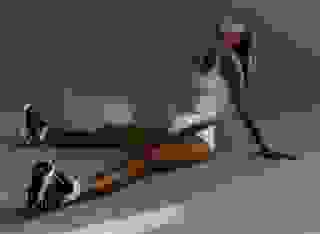Note: You can change font size, font face, and turn on dark mode by clicking the "A" icon tab in the Story Info Box.
You can temporarily switch back to a Classic Literotica® experience during our ongoing public Beta testing. Please consider leaving feedback on issues you experience or suggest improvements.
Click hereI wanted to talk to Max before I did anything further with Maggie. The contents of the roll of film in my pocket would probably change the dynamic of our relationship. So, I said as lasciviously as I could stomach, "I'll rock your world tomorrow after I talk to Max." I probably would. But not in the way she was thinking.
A couple of days passed, and I'd endured three grueling sessions with Maggie before Max called me. He said he wanted to see me. I was in a cheerful mood as I sauntered into his office and draped myself in a chair. He stood up, closed the door, and sat back down.
I said offhandedly, "How did you like my first article? There were even pictures. I'll bet you haven't had news like that in a while?"
Max shuffled a few of the papers on his desk and said, "Good-news, bad-news... which do you want first?"
I said, still cheerful, let's get the bad news out of the way."
Max said, "I'm not running it."
I said, "WHAT!!??"
Max said, "This town has too many cards balanced on each other for your story to upset the apple cart."
I said accusingly, "You showed it to Ebenschlager." I didn't bother to point out how brutally he was mixing his metaphors.
He said, "Of course I did. I have to live here too. But there's also some good news."
I said disgusted, "What's that, Oh-Wise-One?"
Max laughed and said, "What you gave me just made me the guy who's holding all the aces. Ebenschlager and his cronies know that, and they are willing to dance to my tune..."
Then he paused and added significantly, "Just as long as I do them one little favor. And you might like that since it will get you out of this town.
And that's how I ended up at the Columbia University School of Journalism, all expenses paid by the Mayor and his shadowy friends. Blackmail is such an unfortunate term. I would prefer to think of it as the leaders of the town underwriting the ambitions of a deserving young man.
Still, whatever the actual reason for their largesse, Max had me on the train to New York City within the week. I think my parents were actually relieved to see me go. Maggie was beside herself with grief. I didn't want to fill her in on how she had boosted me onto the fast track. She gave me a rousing send off, over-and-over-and-over to the point where I didn't think I would EVER need sex again.
All-in-all Maggie was a good-hearted slut. All she ever wanted in life was a brood of kids. She would make some burgher a great wife once she had them. But married life in a small Wisconsin town was my version of the nineth level of Dante's hell.
********
My knowledge was expanded a lot in the time that I spent in that big brick building on Broadway Avenue. Those studies pushed my worldview up a couple of centuries, right to the leading edge of American journalism. Now, my domain was Runyon and Winchell, Lippman and Grantland Rice.
Of course, shining above them all was the newspaperman turned novelist Ernest Hemingway. I wanted to be just like Ernie and my profs thought I showed promise. So, I had my choice of jobs when I got out of Columbia.
I opted for a "foreign correspondent" role at the Post. That was how Hemingway paid his way while he was writing The Sun Also Rises in Paris.
The New York Post was the liberal rag of the era featuring articles from the likes of Elanor Roosevelt and Drew Pearson. But everybody's interest was focused on what was going on in Europe. As far as I was concerned, that was the place for an aspiring young man to earn his spurs.
I arrived at the Southampton docks on the Aquitania just in time for the London Blitz. I was lucky that way. Most people wouldn't like spending their nights sleeping in a subway tunnel. But I was there to get the scoop and so I began doing personal interviews with my fellow denizens of the Underground and then wiring those pieces back to the AP and Wechsler, who was my editor at the Post.
The people in my home town would have cared less about the subject of my stories. But those folks were still living in the nineteenth century. The Manhattan crowd loved what I was writing, and I was beginning to get a solid reputation as a reporter. I was twenty-three years old, living in a little flat in Russell Square and totally full of myself when my life took another turn.
We'd go down into the tube stations every day around dark. That's when the He 111s would show up. The "whump!!" of the QF 3.7s was like an alarm clock, telling us it was time.
It was a rainy late November night, and I was hunting for a likely target to interview. I concentrated on old folks and mothers with children. Their stories resonated the most with the liberal readership of the Post, who loved to revel in other people's misery.
It happened in a flash. I was making my way through the huddled mass of humanity sleeping or killing time on the concrete floor of the tube. A face looked up at me just as a parachute mine detonated nearby. The overwhelming noise of the blast and the shaking of the subway walls was a perfect counterpoint to the inescapable feeling that my world had inexorably changed.
She was of medium height for a woman, perhaps five four with a neat little figure in a dark grey button up cardigan and a grey pleated skirt. She was sitting on a tartan blanket with her long, bare legs dangling over the edge of the platform talking quietly to a little boy.
The Brits produce some of the most adorable children on the planet and this little guy was a model of blond haired, blue eyed choir-boy excellence. He had a helmet of thick blond hair and the face of innocence as he sat there listening raptly to his mother telling him a story.
I sat down next to her and said in my friendliest tones, "Hi there, my name is Ace." She stopped talking to the boy and swiveled her head to look at me. Her eyes said that she didn't appreciate the interruption. She said, "Do you mind? My son and I would like a little privacy."
I laughed and said, "I'm not making advances Madam. I'm a reporter with the New York Post and I'm telling the story of the Blitz from the perspective of the regular people living through it. Would you care if I asked you a few questions?"
The kid said in his sweet little boy voice, "Oh, could we talk to the man mummy? We'd be in the newspapers."
I smiled at the tyke and said with a bit of irony to his mom, "It'll just take a couple of minutes and you don't have anything better to do - do you?" At that moment, another parachute mine went off and everybody cowered.
She smiled back at me. I could see where the boy got his angelic looks, she really had a beautiful face. She said hesitantly, "All right then -- but I don't see how anybody would find Peter or me interesting." Well... the readership might not be interested. But I was.
I didn't need to ask whether she lived locally. The people sheltering in the tubes all lived near that particular station. You didn't want to be running across town to a favorite stop with 250-kilogram bombs raining down on you.
So, I sat there holding my little notebook while I asked my new friend the usual starter question, where was her husband serving? I just assumed he was serving somewhere. That was an unfortunate question since her husband wasn't serving anywhere. He was buried near Arras, killed during the failed BEF expedition prior to Dunkirk in May of 1940. That was a half year earlier.
Both of them looked sad. I said, "Oh my God!! I'm so sorry!!"
She made a face that said it all and muttered, "I need to carry on. I must be strong." That was the precise point where my mere interest turned into something far greater. In many ways the woman, reflected the zeitgeist of the British people. She hadn't started the war. But she was going to persevere without complaint, until the people who HAD started it were punished.
I said. "I'll leave you alone if you want me to. But I think that your story is something that all of the young mothers who have lost their husbands would want to hear. Your thoughts, feelings and your experiences would be important to any woman in a similar circumstance."
She looked at me skeptically. So, I added, "My aim is to put whatever you tell me into a larger context for the readers back home and I won't publish anything without your approval. But I think that every woman in your shoes would want to know that they aren't alone in this."
She looked at me with wonder and said, "That's EXACTLY the way I feel. I'm the only widow on our street whose children aren't grown up and I'm so very lonely. The future is frightening." Then she added embarrassed, "I'm not whinging, mind you."
She'd used the classic London slang term for a constant complainer. I asked, "Have you always lived in the City?"
She said, "I was raised in Shepherd's Bush. But Nigel and I lived in Stepney before the war. He joined the 60th City of London anti-aircraft regiment. We just assumed that would be safer than the trenches. His unit was caught by the Blitzkrieg, and he was killed a month after he left." THAT, I thought to myself, is the price we ALL may have to pay some day.
The woman had been looking sadder-and-sadder as she talked. Then, she burst into tears. Her little boy leaned his head on her shoulder, and they cried together. I was an American. As far as I was concerned this "European" war was their problem. But the scene next to me simply broke my heart.
I was also a journalist. I was supposed to remain above it all. Still, the sight of the two of them weeping was so heartrending that I hesitantly put my arms around both of them, the way you would do to a total stranger. I wasn't trying to be familiar. I only wanted to provide some human comfort.
At my touch, she turned and buried her head in my shoulder crying hard. It was an awkward situation. I lamely patted her on the back saying consolingly, "There-there." Okay, that was pretty inane. But I'm a reporter, not a pastor. I never claimed to be deep.
People near us were starting to notice and I was beginning to feel really uncomfortable when she finally got herself under control. She stopped sniffling and I produced a clean handkerchief, which I handed to her. She dried her eyes and those of her little boy and tried to hand it back to me. I said, "Keep it."
She said apologetically, "I'm sorry. Sometimes it just gets to be too much."
I said, "It's all right. I'm glad I was here to give both of you a little solace."
She gave me a wan smile and said, "Jane." I looked puzzled and she said by way of clarification, "My name is Jane, and this is Peter." Peter solemnly extended his hand, like a gentleman, and said in his delightfully pipy voice, "Pleased to meet you sir." He was a very polite and well brought up little boy.
That was when I became self-consciously aware that I still had my arm around his mother's shoulders. I hastily removed it, mortified. She gave me a sunny smile and said, "It's all right. It felt good."
I was going to say something equally meaningful but at that point the all-clear sounded and the entire mass of humanity stood up and began to shuffle toward the exits. I could have sat with this woman all night. Now, the damned Luftwaffe wouldn't cooperate when I needed it to.
We obviously couldn't just sit there with our feet dangling off the platform. They might start up the Underground if the tunnels were clear. So, we shuffled with them. We got into the street and the entire area was a wasteland. The Huns were dropping parachute mines around Docklands and that night's southeast wind was blowing them up toward Stepney.
Parachute mines pack a ton of RDX. Thus, whole blocks were simply gone. One of those blocks contained Jane's little flat. So, there was nothing but a hole in the ground where Jane and Peter's former residence had once been.
Think about it and you might get some idea of how devastating that was for Jane. She'd recently lost her husband and now she had lost everything she owned. So, it was perfectly understandable when she sank to her knees covered her face and just began to wail.
Peter, who was quite the stalwart little boy, gathered his mother's head to his chest and said trying to sound brave, "It's okay Mummy -- we'll go camp on the green. It'll be a lark."
That simply wasn't going to happen. I'd rented a flat in the Russel Square area for the duration. It was eleven o'clock and the public transport was starting up again. I reached down and gently raised Jane to her feet, ruffled Peter's head and said in a tone of voice that brooked no disagreement, "You two are staying with me."
*****
And that is how I met and married Jane Ashworth. I know what you might be thinking. So let me remind you that the two of us and her nine-year-old son were all sleeping in a single room with a pull-down Murphy bed. It was warm and cozy. But it was not conducive to romance.
The normal argument ensued. I resolved the question by telling Jane in no uncertain terms that she and Peter would sleep in the bed because I didn't want to be tripping over them during any nighttime excursions to the toilet down the hall. I found some spare blankets and a pillow, and it was actually quite comfortable on my thick rag throw-rug.
The next morning was a perfect November day. I awoke to the smell of coffee. I had been wedged in the space between my desk and the bed all night. I was still in that spot, but the bed was pulled back up and Jane was bustling around brewing coffee on my hot-plate. Peter was sitting cross legged on the floor reading my copy of Ivanhoe.
I propped myself up on one elbow and said, "That's a pretty hefty book for a boy your age, Peter." Jane said matter-of-fact, as she was pouring me a cup of coffee, "It's his favorite novel. He reads it over-and- over."
Peter said with little boy sincerity, "Yes Sir, I want to be like Robin Hood someday." I said, playing along with him, "Don't you want to be Ivanhoe, the chivalrous knight?" He said, "No Sir, I want to help the poor people, not fight battles."
I thought to myself, "Ah, the kid's smart AND an idealist." Peter was beginning to get under my skin in a very serious way.
That could also be said about his mother. Jane had been crushed by the events of last night. But this morning she looked as fresh and lovely as an English rose. She really was a gorgeous woman.
Jane's looks were like a Bronte heroine, with a perfectly proportioned oval face, high cheek bones and a cute, pointed chin. She had hazel, almost golden, cat eyes, and a wide mouth that hinted at both humor and passion. Her shining cloak of wavy brown hair hung loosely to her shoulders, so thick that it swooshed back and forth as she moved her head.
I was definitely NOT into carnal assessments. But it was also evident that Jane was keeping an excellent figure hidden underneath her drab clothes. Her hips in her simple skirt were very tight and curvaceous and the bounty underneath her sweater looked promising. But her long legs were her most outstanding feature.
English girls walk a lot and that produces round shapely calves. Combined with her overall leggy appearance Jane was an exquisite woman. But it was her sunny and steadfast approach to life that was her true attraction. Jane was dedicated to making things better for everybody she loved no matter the situation.
The two of them were dressed in last night's outfits because the rest of their stuff had been vaporized by a ton of RDX. I had a big wad of American cash burning a hole in my pocket and they hadn't instituted clothes rationing yet. So, after my morning coffee I proposed a trip to Marks and Spencer's.
Jane said, "You can go ahead. Peter and I will stay here and try to straighten things up." What can I say. I was a single twenty-three-year-old man. So, NATURALLY, my habitat looked like a den.
I said, "No, I'm taking you two out to get a few things. You can't live forever in the same set of clothes and without a toothbrush." Jane went red with embarrassment. Then she got a stubborn look in her eye and said. "Peter and I can manage without charity."
I laughed and said, "It isn't charity. Call it lend-lease if you like. You need to have a few things if you're going to stay here, and I have more Yankee dollars than I could ever spend."
She said sternly, "And what makes you think that we are going to stay here?"
I said, "Where else are you going to live? Is your family in the area?"
She had a forlorn look as she said, "No, they evacuated to Canada when it all started. My father was in the trenches in the Great War, and he said he never wanted to experience it again."
I said, "So bunk here, at least until you get your feet under you. I'm not around much and I could use the company."
I ruffled the boy's hair and said, "Peter can teach me all about chivalry. I need the lessons."
Jane was still standing there looking stubborn. But she really had no option. If she were single, she might've still declined. But she was thinking of her son. So, she said, "I'll let you help us. But I insist on paying you back."
That wasn't going to happen. She was getting a widow's pension of six Pounds a month to meet expenses. But of course I lied and said, "If that's what it takes to get you to do the right thing then we can work something out." As early as that morning I had made up my mind I was going to marry her.
Love done properly is the intersection between attraction and self-interest. And don't bullshit me. You all know what I'm talking about. People fall in love because they find something in the other person that attracts them. But the decision to make it permanent serves their own purposes.
It might be an altruistic motive like common values, or a sense of empathy. It might be something selfish like status-seeking, or maybe you just like the way they fuck. But one way or another, normal people can tell when they've stumbled on the right person, and you've gotta grab her when you find her.
Jane did that for me, and I was beginning to get the sense that I was doing something like the same thing for her. That was encouraging, because even that early, I couldn't envision any path going forward that didn't have Jane and Peter in it.
The trip to Oxford Street through bomb damaged streets was enlightening. The Blitz lasted from September of 1940 to May of 1941. We know how things turned out now. But nobody at the time had the slightest idea how it would end.
It was late November, and the City of London was experiencing the worst of it. So, you would expect the atmosphere to be filled with despair. What I saw instead was the kind of communal spirit you'd find in my little Wisconsin home town - not in one of the largest cities in the world. Everybody pitched in to keep the appearance of normalcy, no matter how much physical damage had been wreaked.
Londoners were grimly determined to face whatever the Huns could dish out and they were going to do it together. My thought was that, if Herr Hitler was looking to crush the British spirit, he was going about it in exactly the wrong way. The jaunty attitude of, "Carry on old chap," was so infectious that I wrote about it in my weekly dispatches to the AP.
It was clear that Jane was humiliated by having a total stranger give her money, even if it were just to get her back on her feet. So, it was fortunate that I'd brought Peter along to reason with her.
Peter was one of those kids who might be a child chronologically. But he was already an unselfish idealist with the vocabulary of a forty-year-old. And he was quintessentially pragmatic. It was like William James had been reincarnated in a nine-year-old boy.
Peter said in his sweet little voice, "Mummy... Sir is simply trying to be of assistance to us." I'd tried to get Peter to call me Ace. But it was obvious that familiarity with an adult figure bothered him. Courtesy and civility were important qualities for the boy. Peter was plainly destined to be one of His Majesty's top diplomats.








